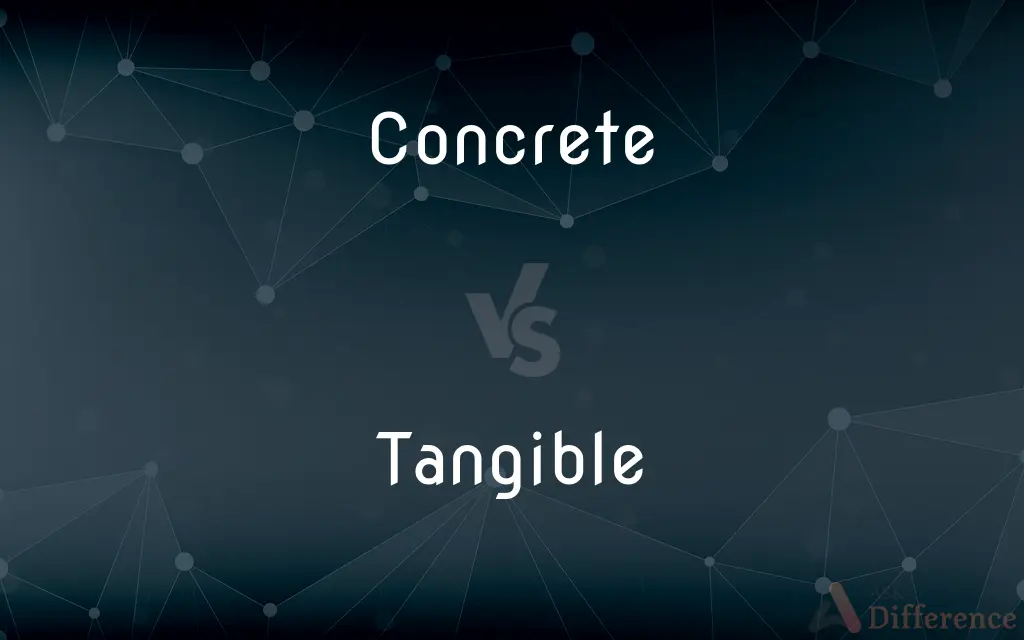Concrete vs. Tangible — What's the Difference?
By Maham Liaqat & Fiza Rafique — Updated on May 5, 2024
Concrete and tangible both relate to physical presence; concrete specifically refers to actual materials or ideas clearly defined, while tangible extends to anything that can be touched or is perceptible by touch.

Difference Between Concrete and Tangible
Table of Contents
ADVERTISEMENT
Key Differences
Concrete is often used to describe items or concepts that are definite and specific in their nature, implying that something is real and solid in form or representation. Whereas, tangible typically refers to things that can physically be touched or felt, emphasizing the sensory aspect of physical existence.
In a metaphorical sense, concrete can be used to express ideas or qualities that are clearly defined or detailed, making them easily understandable. On the other hand, tangible is used to describe abstract concepts that have become real or appreciable, especially in scenarios where evidence or symptoms manifest physically.
Concrete ideas or objects are inherently understood to be distinct and unmistakable because of their well-defined characteristics. Conversely, tangible assets or effects are recognized through physical interaction or direct perception, which can sometimes include broader interpretations like emotional responses.
The use of concrete is predominant in contexts such as construction or logic, where precision and clarity are paramount. In contrast, tangible finds frequent use in legal, financial, and business contexts, referring to physical assets or properties that have actual form and substance.
When describing abstract ideas made accessible or relatable, concrete is employed to communicate the solidity of understanding, as in "concrete examples." Tangible, however, often relates to the practical implications or outcomes of an idea, as in "tangible benefits."
ADVERTISEMENT
Comparison Chart
Definition
Clearly defined, specific
Perceptible by touch, physically real
Usage Context
Material items, clear ideas
Physical interaction, perceptible assets
Emphasis
Clarity and specificity
Physical presence or touch
Common Applications
Construction, logic, education
Business, law, economics
Relation to Abstractness
Makes abstract ideas specific
Makes abstract concepts physically real
Compare with Definitions
Concrete
Used to describe features that are clearly defined.
The instructions were concrete and easy to follow.
Tangible
Capable of being touched or felt; having actual form.
The relief on their faces was almost tangible.
Concrete
Existing in a material form or as something that is measurable.
The scientist provided concrete evidence to support the theory.
Tangible
Used to describe evidence that can be clearly seen or touched.
They sought tangible proof of the product's quality.
Concrete
Refers to tangible examples that illustrate abstract concepts.
The teacher used concrete examples to explain the math principle.
Tangible
Concerning physical manifestations of otherwise abstract qualities.
There was a tangible sense of excitement in the air.
Concrete
Pertaining to actual substances or real objects.
The bridge was built with steel and concrete.
Tangible
Relating to things that are perceptible by touch or substantially real.
The company has a lot of tangible assets like buildings and machinery.
Concrete
Relating to ideas or plans that are detailed and certain.
We need a concrete plan of action with specific steps.
Tangible
Pertains to effects or outcomes that are observable and measurable.
The new policy had tangible benefits for the community.
Concrete
Concrete is a composite material composed of fine and coarse aggregate bonded together with a fluid cement (cement paste) that hardens (cures) over time. In the past, lime based cement binders, such as lime putty, were often used but sometimes with other hydraulic cements, such as a calcium aluminate cement or with Portland cement to form Portland cement concrete (named for its visual resemblance to Portland stone).
Tangible
Discernible by the touch; palpable
A tangible roughness of the skin.
Concrete
Existing in a material or physical form; not abstract
Concrete objects like stones
Tangible
Possible to touch.
Concrete
A building material made from a mixture of broken stone or gravel, sand, cement, and water, which can be spread or poured into moulds and forms a mass resembling stone on hardening
Slabs of concrete
Concrete blocks
Tangible
Possible to be treated as fact; real or concrete
Tangible evidence.
Concrete
Cover (an area) with concrete
The precious English countryside may soon be concreted over
Tangible
Possible to understand or realize
The tangible benefits of the plan.
Concrete
Form (something) into a mass; solidify
The juices of the plants are concreted upon the surface
Tangible
(Law) Relating to or being property of a physical nature, such as land, objects, and goods.
Concrete
Of or relating to an actual, specific thing or instance; particular
Had the concrete evidence needed to convict.
Tangible
Something palpable or concrete.
Concrete
Relating to nouns, such as flower or rain, that denote a material or tangible object or phenomenon.
Tangible
Tangibles Property having a physical form.
Concrete
Existing in reality or in real experience; perceptible by the senses; real
Concrete objects such as trees.
Tangible
; able to be touched or felt; perceptible by the sense of touch.
Concrete
Formed by the coalescence of separate particles or parts into one mass; solid.
Tangible
; able to be perceived.
Concrete
Made of hard, strong, conglomerate construction material.
Tangible
Able to be treated as fact; real or concrete.
Concrete
A hard, strong construction material consisting of sand, conglomerate gravel, pebbles, broken stone, or slag in a mortar or cement matrix.
Tangible
By the mind; understandable.
Concrete
A mass formed by the coalescence of particles.
Tangible
A physical object; something that can be touched.
Concrete
To build, treat, or cover with hard, strong conglomerate construction material.
Tangible
Or concrete results.
Yes, but what are the tangibles?
Concrete
To form into a mass by coalescence or cohesion of particles or parts.
Tangible
Perceptible to the touch; tactile; palpable.
Concrete
To harden; solidify.
Tangible
Capable of being possessed or realized; readily apprehensible by the mind; real; substantial; evident.
Direct and tangible benefit to ourselves and others.
Concrete
Real, actual, tangible.
Fuzzy videotapes and distorted sound recordings are not concrete evidence that Bigfoot exists.
Once arrested, I realized that handcuffs are concrete, even if my concept of what is legal wasn’t.
Tangible
Perceptible by the senses especially the sense of touch;
Skin with a tangible roughness
Concrete
Being or applying to actual things, not abstract qualities or categories.
Tangible
Possible to be treated as fact;
Tangible evidence
His brief time as Prime Minister brought few real benefits to the poor
Concrete
Particular, specific, rather than general.
While everyone else offered thoughts and prayers, she made a concrete proposal to help.
Concrete ideas
Tangible
(of especially business assets) having physical substance and intrinsic monetary value ;
Tangible property like real estate
Tangible assets such as machinery
Concrete
United by coalescence of separate particles, or liquid, into one mass or solid.
Tangible
Capable of being perceived by the senses or the mind; especially capable of being handled or touched or felt;
A barely palpable dust
Felt sudden anger in a palpable wave
The air was warm and close--palpable as cotton
Concrete
Made of concrete, a building material.
The office building had concrete flower boxes out front.
Tangible
Having substance or material existence; perceptible to the senses;
A physical manifestation
Surrounded by tangible objects
Concrete
(obsolete) A solid mass formed by the coalescence of separate particles; a compound substance, a concretion.
Concrete
Specifically, a building material created by mixing cement, water, and aggregate such as gravel and sand.
The road was made of concrete that had been poured in large slabs.
Concrete
(logic) A term designating both a quality and the subject in which it exists; a concrete term.
Concrete
Sugar boiled down from cane juice to a solid mass.
Concrete
(US) A dessert of frozen custard with various toppings.
Concrete
(chemistry) An extract of herbal materials that has a semi-solid consistency, especially when such materials are partly aromatic.
Concrete
To cover with or encase in concrete (building material).
I hate grass, so I concreted over my lawn.
Concrete
To solidify: to change from being abstract to being concrete (actual, real).
Concrete
To unite or coalesce into a mass or a solid body.
Concrete
United in growth; hence, formed by coalition of separate particles into one mass; united in a solid form.
The first concrete state, or consistent surface, of the chaos must be of the same figure as the last liquid state.
Concrete
Standing for an object as it exists in nature, invested with all its qualities, as distinguished from standing for an attribute of an object; - opposed to abstract.
Concrete is opposed to abstract. The names of individuals are concrete, those of classes abstract.
Concrete terms, while they express the quality, do also express, or imply, or refer to, some subject to which it belongs.
Concrete
A compound or mass formed by concretion, spontaneous union, or coalescence of separate particles of matter in one body.
To divide all concretes, minerals and others, into the same number of distinct substances.
Concrete
A mixture of gravel, pebbles, or broken stone with cement or with tar, etc., used for sidewalks, roadways, foundations, etc., and esp. for submarine structures.
Concrete
A term designating both a quality and the subject in which it exists; a concrete term.
The concretes "father" and "son" have, or might have, the abstracts "paternity" and "filiety".
Concrete
Sugar boiled down from cane juice to a solid mass.
Concrete
To unite or coalesce, as separate particles, into a mass or solid body.
Concrete
To form into a mass, as by the cohesion or coalescence of separate particles.
There are in our inferior world divers bodies that are concreted out of others.
Concrete
To cover with, or form of, concrete, as a pavement.
Concrete
A strong hard building material composed of sand and gravel and cement and water
Concrete
Cover with cement;
Concrete the walls
Concrete
Form into a solid mass; coalesce
Concrete
Capable of being perceived by the senses; not abstract or imaginary;
Concrete objects such as trees
Concrete
Formed by the coalescence of particles
Common Curiosities
Why is it important to have concrete plans?
Concrete plans ensure clarity and specificity, reducing ambiguity and enhancing understanding.
What is the role of concrete examples in teaching?
Concrete examples help clarify abstract concepts, making them easier for students to understand.
Are all concrete objects tangible?
Yes, all concrete objects are tangible as they have a definite form and substance.
What does concrete mean in everyday language?
It refers to something that is clearly defined or physically existing.
How does tangible differ from concrete?
Tangible specifically relates to what can be touched, while concrete encompasses broader clear and specific realities.
Can ideas be tangible?
Ideas become tangible when they have a physical manifestation or measurable impact.
What are examples of tangible assets?
Tangible assets include physical properties like land, buildings, and machinery.
How can an abstract concept be made concrete?
By providing specific examples or scenarios that clearly illustrate the concept.
What makes an evidence tangible?
Evidence is tangible when it can physically be seen, touched, or directly measured.
Can feelings be tangible?
While feelings are inherently abstract, they can manifest in tangible ways, such as through physical expressions or actions.
Share Your Discovery

Previous Comparison
Chamomile vs. Daisies
Next Comparison
Chromatography vs. ChromatogramAuthor Spotlight
Written by
Maham LiaqatCo-written by
Fiza RafiqueFiza Rafique is a skilled content writer at AskDifference.com, where she meticulously refines and enhances written pieces. Drawing from her vast editorial expertise, Fiza ensures clarity, accuracy, and precision in every article. Passionate about language, she continually seeks to elevate the quality of content for readers worldwide.
















































